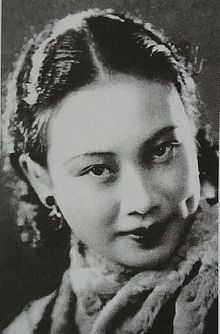Hu Die (actress)
| Hu Die Butterfly Hu |
|
|---|---|

Hu Die in the 1930s
|
|
| Background information | |
| Chinese name | 胡蝶 |
| Pinyin | Hú Dié (Mandarin) |
| Birth name | Hu Ruihua (胡瑞华) |
| Born | 1907 or 1908 Shanghai, China |
| Died | 23 April 1989 (aged 81) Vancouver, British Columbia, Canada |
| Occupation | Actress |
| Spouse(s) | Pan Yousheng (m. 1935; d. 1958) |
| Children | Hu Yousong (1939–2008) wife of Li Zongren |
Hu Die (Chinese: 胡蝶; Wade–Giles: Hu Tieh; 1907 or 1908 – April 23, 1989), also known by her English name Butterfly Wu, was one of the most popular Chinese actresses during the 1920s and 1930s. She starred in The Burning of the Red Lotus Temple, which started a craze for martial arts films, Sing-Song Girl Red Peony, China's first sound film, and what is considered her best film, Twin Sisters. She was voted China's first "Movie Queen" in 1933, and won the Best Actress Award at the 1960 Asian Film Festival for her performance in Rear Door.
Hu Die was born Hu Ruihua (Chinese: 胡瑞华; Wade–Giles: Hu Jui-hua) in Shanghai in 1907 or 1908, and moved to Guangzhou (Canton) when she was nine. Her father then became the general inspector of the Beijing–Fengtian Railway, and she spent much of her adolescence in northern cities including Beijing, Tianjin and Yingkou, and learned to speak perfect Mandarin, which later proved to be a great advantage when the Chinese cinema transitioned from silent films to talkies.
In 1924, Hu Ruihua moved back to Shanghai with her family. When China (Zhonghua) Film School, the country's first film actor training school, opened, she was the first student to enroll. She adopted the professional name "Hu Die", meaning "butterfly", and Butterfly Wu in English (Wu is the Shanghainese pronunciation of Hu).
...
Wikipedia
